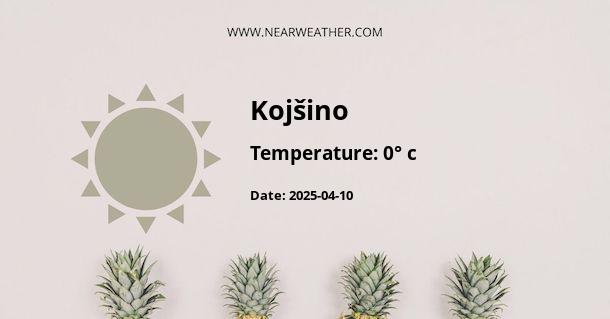An In-depth Look into Kojšino's Climate and Year-Round Weather Patterns
Kojšino, a small village located in Bosnia and Herzegovina, experiences a climate that is shaped by both its geographical position in the Balkans and its terrain which includes mountains, valleys, and rivers. Understanding the climate and weather patterns of Kojšino is essential for those planning to visit or study the region. We will delve into the details of Kojšino's climate, examining its seasonal variations and weather behaviour to provide a comprehensive guide to what one can expect weather-wise throughout the year.
Geographical Influence on Climate
Kojšino's climate is classified as continental with Mediterranean influences. This classification takes into account the area's latitude, topography, and proximity to the Adriatic Sea, which all play critical roles in shaping the local weather.
Seasonal Weather Patterns in Kojšino
In Kojšino, the seasons are distinct, with cold winters, warm summers, and transitional autumn and spring seasons. Below is an overview of the weather characteristics for each season:
Winter (December to February)
- Temperature: During the winter months, the average temperature ranges from -5°C to 5°C, with January being the coldest month of the year.
- Snowfall: Snow is common, with accumulations varying each year. Mountainous areas tend to receive higher snowfall amounts.
- Precipitation: Winters are generally wet due to cyclonic activities, resulting in frequent precipitation which can sometimes turn into ice, given the low temperatures.
- Daylight: Daylight is limited during winter, with short days and long nights.
Spring (March to May)
- Temperature: As spring sets in, temperatures gradually rise from an average of 5°C in March to around 18°C in May.
- Rainfall: This season is characterized by moderate rainfall as the snow begins to melt, recharging rivers and groundwater.
- Vegetation: Spring marks the blooming period, with a noticeable greenery increase, making it a particularly attractive season for nature enthusiasts.
- Daylight: Daylight hours increase significantly as the season progresses, leading to longer days.
Summer (June to August)
- Temperature: Summer is warm with average high temperatures between 20°C and 30°C. Heatwaves can occasionally push temperatures higher.
- Thunderstorms: Summer afternoons often bring thunderstorms, resulting from the interaction between warm air masses and relief.
- Humidity: Humidity levels can be high, contributing to the feeling of warmth and occasionally discomfort during peak summertime.
- Outdoor Activities: This season is popular for tourism, offering ideal conditions for outdoor activities and exploration.
Autumn (September to November)
- Temperature: Temperatures start to cool down, averaging from 20°C in September to around 10°C in November.
- Precipitation: Rainfall increases again during autumn, preparing the landscape for the winter cold with a moist environment.
- Daylight: Days start to shorten again, leading to cooler nights and the onset of the first frosts towards the end of the season.
- Foliage: The changing leaves provide a picturesque setting, as the foliage takes on vibrant autumnal hues before falling.
Monthly Weather Overview
Please note that the climatic data provided below is a generality; specific weather conditions can vary yearly and are increasingly subject to change due to global climate patterns.
| Month | Average High (°C) | Average Low (°C) | Precipitation (mm) |
|---|---|---|---|
| January | -1 | -7 | 69 |
| February | 2 | -5 | 65 |
| March | 8 | 0 | 70 |
| April | 14 | 5 | 76 |
| May | 20 | 9 | 86 |
| June | 24 | 13 | 90 |
| July | 26 | 14 | 76 |
| August | 26 | 14 | 72 |
| September | 22 | 11 | 80 |
| October | 16 | 7 | 82 |
| November | 9 | 2 | 95 |
| December | 2 | -3 | 83 |
Climate Change Impact on Kojšino
Climate change is a global phenomenon affecting all parts of the world, including Kojšino. Bosnia and Herzegovina, and the Balkans in general, have experienced shifts in seasonal patterns, more intense precipitation events, and rising temperatures. These changes can lead to various environmental challenges such as increased risk of flooding, landslides, and adverse effects on local ecosystems and agriculture.
Climate Adaptation and Resilience Strategies
To cope with climate change impacts, it is crucial for areas like Kojšino to implement adaptation and resilience strategies. These measures may include:
- Enhanced land use planning and forest management to prevent soil erosion and flooding.
- Improved water resource management to ensure a reliable supply during dry spells and reduce the potential for flood damage.
- Support for agricultural practices that are resilient to climatic changes, potentially introducing crop varieties better suited to the changing conditions.
- Public education and awareness campaigns to encourage sustainable practices among local residents and businesses.
In conclusion, Kojšino's climate offers a diverse range of weather experiences throughout the year, from snow-covered winters to warm, lush summers. As with many regions, it faces challenges due to climate change, but proactive measures can help safeguard Kojšino's natural beauty and agricultural heritage for the future. Understanding the local climate and weather patterns is crucial for visitors, residents, and policymakers alike to ensure that they are well-prepared for what each season brings.
A - Kojšino's Latitude is 44.548328 & Longitude is 18.683331.
A - Weather in Kojšino is 10° today.
A - Climate Conditions in Kojšino shows clear sky today.
A - Humidity in Kojšino is 93% today.
A - Wind speed in Kojšino is 1.84 km/h. today.
